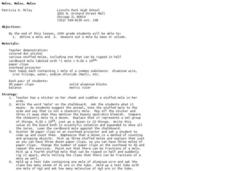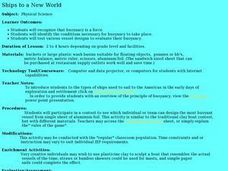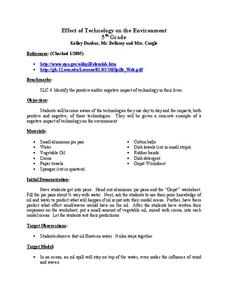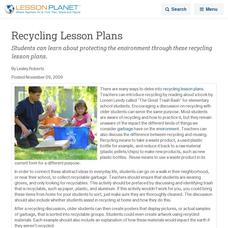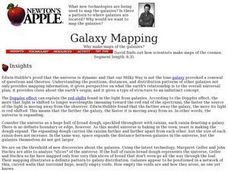Curated OER
What is an Atom?
Third graders understand that the smallest particle is an atom. In this matter lesson plan, 3rd graders make a piece of aluminum smaller and smaller to see that what's left is still aluminum. Students recognize that cutting into smaller...
Curated OER
Understanding Watersheds
Students should learn how their actions on land can affect the water quality of lakes and rivers.
Curated OER
Moles, Moles, Moles
Students investigate moles and measure out a mole by mass and volume. In this mole lesson plan, students observe demonstrations of quantities of substances that measure 1 mole. Students use a solid aluminum block and ruler to measure the...
Curated OER
Ships to a New World
Students experiment with buoyancy as a force. In this buoyancy lesson, students access an assigned website to examine the sailing vessels that came to the New World. They work as teams to build boats out of aluminum foil to see which...
Curated OER
Identifying Watersheds with Topographic Maps
Students model a watershed and delineate one using topographic maps. In this hydrology lesson, students use aluminum foil to model a landscape and observe how water moves on it. They also observe the features of a topographic map and use...
Curated OER
I've Got That Sinking Feeling
Middle schoolers design a simple boat and predict how much weight it can carry. They should also discover why objects float or sink and how this can be determined experimentally. A great lesson on buoyancy!
Curated OER
The Magic School Bus Out of This World
Students learn along with Ms. Frizzle's class. For this Magic School Bus lesson plan, students explore craters that objects of different sizes and weights (marbles, Ping-Pong balls, and aluminum foil balls) create.
Curated OER
Learning About Matter And Energy
Students learn about matter and energy. In this science lesson plan, students gain an understanding of the properties of matter and energy as they discover that some things float, some things dissolve in water and discuss that energy can...
Curated OER
Buoyant Boats
Students design and construct a boat out of aluminum foil and a few other simple materials. The boats then be tested by floating them in water, then adding mass until they sink. They explore the various shapes of boat construction.
Curated OER
Effect Of Technology on the Environment
Fifth graders create their own oil spill to explore the various ways in which technology can have a negative impact on the environment. They discuss the daily use of technology and it's ability to be a positive for some groups and a...
Curated OER
Density Demonstration: Coke vs. Diet Coke
In this density demonstration, students compare a can of diet coke to a can of regular coke. They list the similarities and differences of each prior to the demonstration. The cans are placed in a tank of water and students record their...
Curated OER
Earthquake Lesson Plans
With earthquakes a regular occurrence all over the world, including a recent one in Haiti, students can learn about these phenomena.
Curated OER
Recycling Lesson Plans
Students can learn about protecting the environment through these recycling lesson plans.
Curated OER
Directing Sound Waves
Students learn that sound waves can be directed and collected. In this sound wave experiment, students create and collect sound waves. Students learn sound waves travel differently through different states of matter.
Curated OER
Change It
Fourth graders expand their knowledge about how the physical properties of a substances can be changed. They are given multiple opportunities, using first-hand experiences and familiar objects in different contexts, to identify...
Curated OER
Recycling
For this recycling worksheet, learners explore what materials can be recycled and the impact recycling can have on conserving resources. This worksheet has 8 short answer questions.
Curated OER
Reduce Reuse Recycle
Learners discover methods that can save the planet by recycling. In this sustainable planet lesson, students read The Berenstein Bears Don't Pollute Anymore, and practice memorizing the 3 R's. Learners write commitment...
Curated OER
Mining Simulation
Eighth graders put their knowledge of rocks and minerals into perspective by seeing how minerals can be mined and the difficulties and costs of mining. They explore the environmental impacts of mining.
Curated OER
Reduce, Reuse, Recycle
Students brainstorm and share opinions about products that can be reused or recycled after reading the article, "Seattle's Recycling Success Is Being Measured in Scraps." They then investigate, analyze and evaluate articles on recycling...
Curated OER
Galaxy Mapping
Learners research the constellations and discuss their findings. Then they construct their own maps of the galaxy using paper, black paint, aluminum foil, etc. They make a 3-D map of their chosen constellation.
Curated OER
Floodplain Modeling
Learners simulate the impact of fluctuating river volumes on structures and landforms. They experiment with table top-sized riverbed models and water. Students consider how human design can help mitigate the effects of a flood.
Curated OER
Common Ions and Their Charges
In this chemistry activity, students can use the table to observe and name the common types of ions and determine the charges to explain the gain or loss of electrons.
Curated OER
Can We Measure the Impossible?
In this measurement worksheet, students explore methods to measure the thickness of foil. They write an essay on how they calculated the thickness of the foil, and the number of atoms thick it is. Students create labeled sketches to...
Foundation for Water & Energy Education
What is the Water Cycle? Activity B
Curious physical scientists follow a lesson on the properties of water with this lesson on distillation. They observe a miniature water cycle model that filters dirty water into clean water. These two lessons combined are an enriching...


